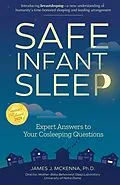In the world of pediatric care, sleep safety guidelines are controversial and often misguided. Health professionals broadly discourage all forms of cosleeping, which, along with the potentially devastating consequences, makes deciding how and where your baby should sleep both confusing and frightening. Parents who cherish the closeness, security, and warmth of cosleeping are finding themselves conflicted, concerned, and exhausted.
Cosleeping, a term which encompasses sleeping in the same room or on the same bed as your infant, is a common parental instinct driven by physiology and seen throughout human history. Despite mainstream opposition, thousands of parents continue the practice, whether intentionally, accidentally, or out of necessity.
So, why do current medical guidelines insist that cosleeping is unsafe? What is the difference between SIDS and SUID, and are they related to cosleeping? What should parents do to make a safe sleep space for their infant? If a family chooses to cosleep, how should they respond to reproach from friends, family, or medical professionals?
In Safe Infant Sleep, the world's authority on cosleeping breaks down the complicated political and social aspects of sleep safety, exposes common misconceptions, and compares current recommendations to hard science. With the latest information on the abundant scientific benefits of cosleeping, Dr. James J. Mckenna informs readers about the dangers of following over-simplified recommendations against the age-old practice, and encourages parents to trust their knowledge and instincts about what is and is not safe for their baby.
This book offers a range of options and safety tips for your family's ideal cosleeping arrangement. These include variations of roomsharing and bedsharing, and introduce the concept of "breastsleeping." This term, coined by Dr. McKenna himself, is based on the inherent biological connection between breastfeeding and infant sleep, and provides readers with everything they need to know about safely sharing a bed with their baby. Complete with resource listings for both parents and professionals, this book teaches you how to confidently choose a safe sleeping arrangement as unique as your family.
Autorentext
Dr. James J. McKenna directed the Mother-Baby Behavioral Sleep Laboratory at the University of Notre Dame for 22 years. He received his undergraduate degree in anthropology from the University of California, Berkeley, his Master's Degree from San Diego State University, and in 1975 earned his Ph.D. in biological anthropology from the University of Oregon, Eugene. He pioneered the world's first studies of the physiology and behavior of cosleeping mothers and infants, and has published over 140 scientific articles in medical and anthropological journals on the topics of cosleeping, breastfeeding, evolutionary medicine, and SIDS. He has also authored several books, including Ancestral Landscapes in Human Evolution, Evolutionary Medicine, Sleeping With Your Baby, and Researching the Sudden Infant Death Syndrome: The Role of Ideology in Biomedical Science. A leading authority on breastfeeding in relationship to SIDS and bedsharing safety, Dr. McKenna is a sought-after speaker at medical, parenting, and policy conferences around the world.
Klappentext
Throughout history and across cultures, sleeping with your baby has been the norm. Yet, in our modern world, the practice is fraught with questions, fear, and guilt. In Safe Infant Sleep, a globally recognized cosleeping authority explores why health professionals broadly recommend against all forms of cosleeping, shares the latest scientific research on the benefits of the practice, and helps you determine the best cosleeping arrangement for your family-from breastsleeping to room sharing. Pediatrician Jay Gordon writes "This is the most important book you will ever buy or give as a gift to new parents." Doctor and popular health consultant William Sears says "Safe Infant Sleep is a must-read for every expectant and new parent, and belongs in the required reading library of every babycare advisor."
Inhalt
Introductions
Breastsleeping: What it Means and Why it's Important
I. Cosleeping is Normal
Chapter 1: Why I Care So Much About This Subject
Chapter 2: What is Cosleeping?
Cosleeping vs. Breastsleeping
Cosleeping: The Normal and Safe Way for Mothers and Babies to Sleep
Chapter 3: The History of Cosleeping
Cosleeping Around the World
History of Infant Sleep in Western Industrialized Societies
How the Animals Do It
II. The Politically-Charged Conversation Around Cosleeping
Chapter 4: "Never Cosleep!"
Why Public Health Officials Tell You This
Why the Message Doesn't Work
Understanding the Statistics
Bedsharing and the American Academy of Pediatrics
How Current Recommendations Ignore Evidence Based Medicine
The Misguided Public Health Goal: One Message to Curb Two Kinds of Infant Death
Chapter 5: The Silent P
The Relationship Between Cosleeping Deaths and Poverty
III. Everything You Need to Know About Cosleeping
Chapter 6: What the Research Tells Us
The Science Behind Breastsleeping
Bedsharing for Fathers
Why Cosleeping is Important for Breastfeeding, Bottlefeeding, and Formula Feeding
Chapter 7: Benefits of Cosleeping
Cosleeping is Good for Babies
Benefits of Increased Breastfeeding
Breastsleeping and Colic
How Par…
